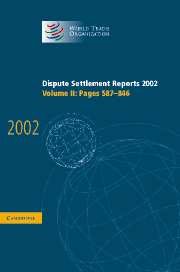United States – Section 211 Omnibus Appropriations Act of 1998 (WT/DS176): Report of the Panel
Published online by Cambridge University Press: 13 December 2017
Summary
INTRODUCTION
On 7 July 1999, the European Communities and their member States (hereafter referred to as the “European Communities”) requested consultations with the United States under Article 4 of the Understanding on Rules and Procedures Governing the Settlement of Disputes (the “DSU”) and, to the extent it incorporates by reference Article XXIII of the General Agreement on Tariffs and Trade 1994, Article 64.1 of the Agreement on Trade-Related Aspects of Intellectual Property Rights (the “TRIPS Agreement”) regarding Section 211 of the Omnibus Appropriations Act of 1998 (the “OAA”).
The European Communities and the United States held consultations on 13 September and 13 December 1999, but failed to reach a mutually satisfactory solution. On 30 June 2000, the European Communities requested the establishment of a panel under Article 6 of the DSU and Article 64.1 of the TRIPS Agreement.
At its meeting on 26 September 2000, the Dispute Settlement Body (the “DSB”) established a panel in accordance with Article 6 of the DSU with the following standard terms of reference:
“To examine, in the light of the relevant provisions of the covered agreements cited by the European Communities and their member States in document WT/DS176/2, the matter referred to the DSB by the European Communities and their member States in that document and to make such findings as will assist the DSB in making the recommendations or in giving the rulings provided for in those agreements.”
Canada, Japan and Nicaragua reserved their rights to participate in the panel proceedings as third parties.
On 17 October 2000, the European Communities made a request, with reference to paragraph 7 of Article 8 of the DSU, to the Director-General to determine the composition of the Panel. This paragraph states:
If there is no agreement on the panelists within 20 days after the date of the establishment of a panel, at the request of either party, the Director-General, in consultation with the Chairman of the DSB and the Chairman of the relevant Council or Committee, shall determine the composition of the panel by appointing the panelists whom the Director-General considers most appropriate in accordance with any relevant special or additional rules or procedures of the covered agreement or covered agreements which are at issue in the dispute, after consulting with the parties to the dispute.
- Type
- Chapter
- Information
- Dispute Settlement Reports 2002 , pp. 683 - 838Publisher: Cambridge University PressPrint publication year: 2004
- 2
- Cited by

